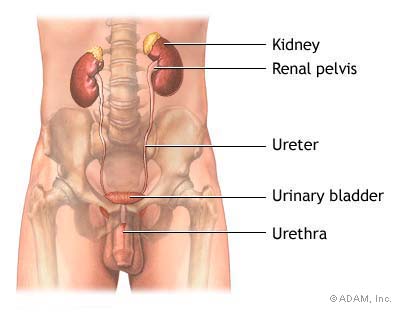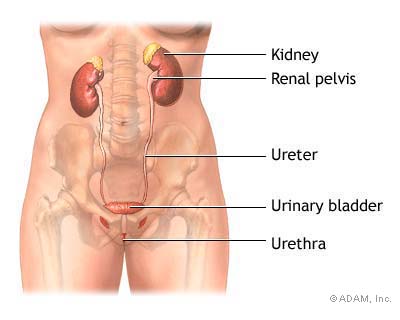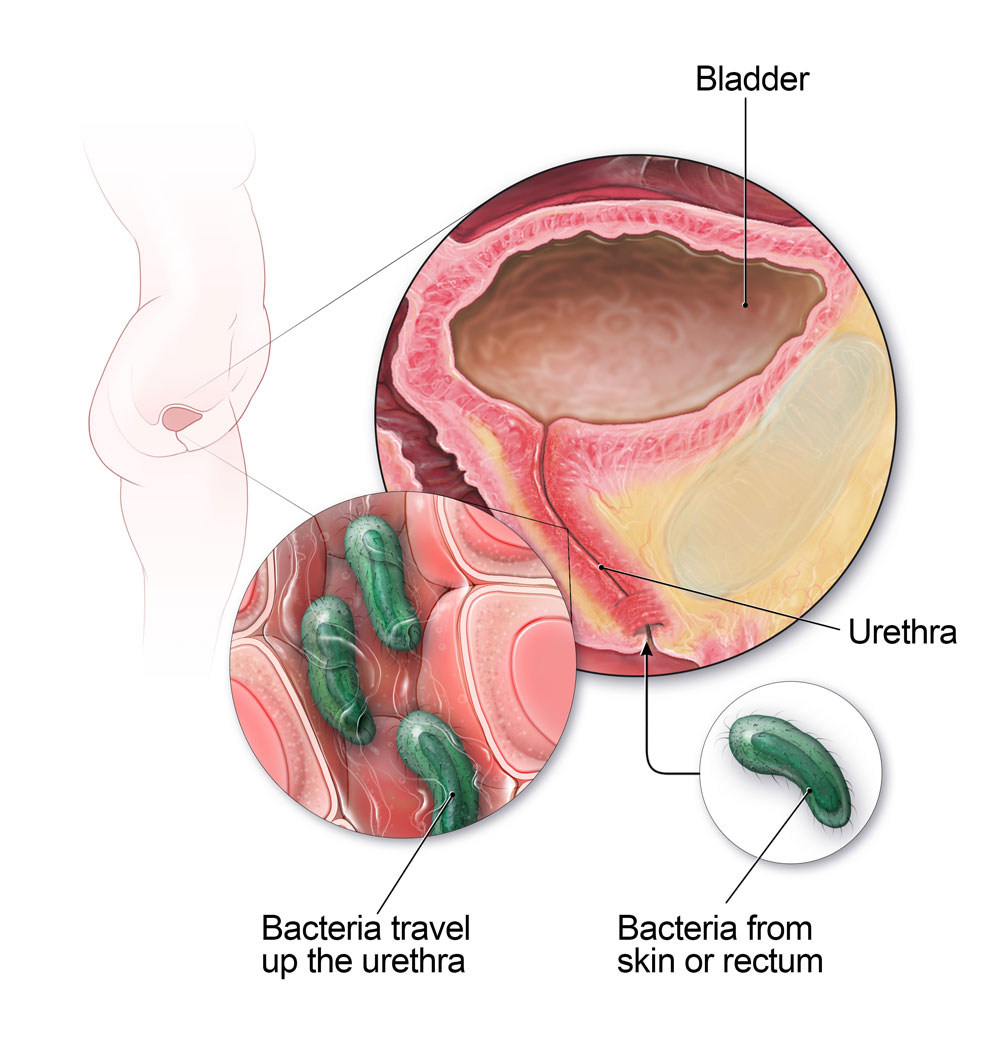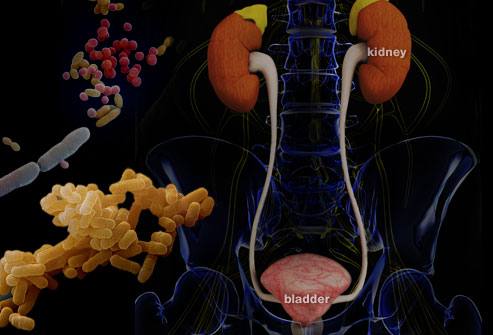Did you know?
Urinary Tract Infection is the third most common disease experienced by humans after respiratory and gastrointestinal infections?
Infection of Urinary Tract is more common in women than men or children.
As more than 50 percent of women will develop a Urinary Tract Infection symptoms in their lifetimes.
When I found out that, I was simply blown away! That’s a lot of inconvenience to a lot of women.
That’s when we decided here at vitsupp that everybody needs to know more about this. To know what this is, how to deal with it, and how if we act early, take a few precautions, and use a few simple home remedies we can avoid antibiotics (the primary method of UTI treatment).
So if you have a friend, girlfriend, or sister who can benefit, share this with them so that they know what to do when faced with this.
Contents
- What is Urinary Tract Infection
- General Urinary Tract Infections Symptoms
- Urinary Tract Infection Home Remedies
- Other Treatment for Urinary Tract Infection
- Ayurvedic Medicine for Urinary Tract Infection Treatment
- How to prevent Urinary Tract Infection in Females and others
- Predisposition to Urinary Tract Infection
- The young & the old are a high risk group for urinary tract infection:
- Tests for Urinary Tract Infection
- Frequently Asked Questions on UTI
- REFERENCES:
What is Urinary Tract Infection
Image: webmd.com
Urinary Tract Infection is also known as UTI among health care professionals. It is a condition in which bacteria get established and start growing within the urinary tract. UTI can be an infection of one or multiple parts of the urinary system.
In healthy individuals, the urine in the bladder is sterile—no bacteria or other infectious organisms are present. The tube that carries urine from the bladder out of the body (urethra) also contains no bacteria or so few that they cannot lead to an infection.
However, any part of the urinary tract can become infected. An infection that occurs anywhere along the urinary tract is called a urinary tract infection (UTI). UTI affects the urinary system which includes kidneys, ureters, the bladder, urethra, sphincter muscles and prostate gland.
Anyway I won’t get further into the biological lesson and bore you. 🙂
Urinary Tract Infection in Women
More than 50 percent of women will develop a Urinary Tract Infection and its symptoms in their lifetimes. Also if antibiotics have repeatedly been used to control a previous UTI, such bacteria may then become antibiotic-resistant. In such case, consecutive infections are harder to control.

We wanted to get insights from a notable person in this field regarding how a woman gets a urinary tract infection. Karyn Eilber is a board-certified urologist with over 20 years of experience looking after women’s most intimate needs. She said, “A very common way is through sexual activity that brings bacteria closer to the opening of the urethra (where urine comes out), then the bacteria can ascend through the urethra into the bladder. Urinary tract infection, or UTI, is an infection anywhere along the urinary tract including kidneys and bladder but usually refers to the bladder.”
Urinary Tract Infection in Men
Men generally become a lot more prone to UTIs when they reach their senior years (50 years upwards) and begin to develop prostate issues.
Benign endocrine dysplasia (BPH), enlargement of the endocrine leads to an obstruction within the tract and increase the danger of infection.
In men, repeated Urinary Tract Infections are related to inflammation, associated infection of the prostate.
Such infections cause a lot of serious issues to men than they are doing in ladies. Men with UTIs are way more possible to be hospitalized than ladies.
General Urinary Tract Infections Symptoms
The key symptoms of urinary tract infection are as follows:
- A burning feeling during urination
- A frequent and intense urge to urinate, even though the bladder is empty
- Cloudy, dark, bloody, or strange-smelling urine
- Pain or pressure in either side of the lower back
- Pain in the lower abdomen
- Fever or chills accompanied by the above Urinary Tract Infection symptoms may be a sign that the disease may have reached your kidneys.
Urinary Tract Infection Symptoms in Women
Urinary Tract Infection Symptoms in women are primarily caused by bacteria.
When these infections are treated with antibiotics, about 30 to 40% of UTI’s recur within six months. The antibiotic treatment to address bacterial infection, which seems to work at first, does not produce a lasting cure.
UTI symptoms in women are:
- Feeling or the need to urinate more than usual
- Burning sensation and/or pain during urination
- Strong urine smell
- Lack of urine control with a sense of urgency during urination
- Nausea and Vomiting
- Cramps or pain in the lower abdomen
- Pain during sexual intercourse
- Blood or pus in the urine
- Chills or fever
Symptoms of Urinary Tract Infection in Men
As mentioned earlier, UTI is much more common in women than men.
However, this is where the distinction comes into the picture as younger men are largely unaffected. Men older than 50 have been found to be much more susceptible to UTIs.
Primary symptoms of UTI in men are:
- Feeling or the need to urinate more than usual
- Lack of urine control with a sense of urgency during urination
- Pain, discomfort or a burning sensation during urination
- Leaking Urine
- Sleep disturbance with a need to pass urine
- Pain, pressure or tenderness in the area of the bladder (in the middle of the lower abdomen, below the navel)
- Pain in the side or upper back
- Unusual Bed-wetting problem
- Foul smelling and cloudy urine
- Fever, with or without chills
- Nausea and vomiting
Uncommon Urinary Tract Infection Symptoms in the young & the old:

- Newborns: hypothermia (low temperature) or fever (high temperature), poor feeding, jaundice could indicate a Urinary Tract Infection. You will need a doctor to rule this out.
- Infants: vomiting, diarrhoea, fever, poor feeding, not sleeping well and generally not thriving
- Children: irritability, eating poorly, unexplained recurrent fever, loss of bowel control, loose bowels, pain during urination, change in urinating pattern
- Older adults: fever or hypothermia, poor appetite, lethargy, change in mental status. Delirium and UTI’s are two very common conditions in the elderly. In a 2014 systematic review, elderly patients with UTI’s suffered from delirium rates that ranged from 30 percent to 35 percent compared to only 7 percent or 8 percent in those without UTI’s. In the senior care field, delirium is considered as one of the atypical symptoms of UTI in the elderly. Therefore doctors generally order a workup for Urinary Tract Infections whenever there is an onset of delirium in an older patient.
Bacterial Urinary Tract Infection Symptoms
Bacterial urinary tract infection can occur in the urethra, prostate, bladder, or kidneys.
The primary symptoms of Urinary Tract Infection caused by Bacteria are:
- Increased urine frequency
- Feeling of urine urgency
- Dysuria (Dysuria is the medical term for pain or discomfort when urinating. It indicates lower urinary tract infection or bladder infection.)
- Lower abdominal and flank pain.
Symptoms of Urinary Tract Infection and kidney Infection (This is the most serious kind of UTI!)

Image: webmd.com
Ok so as mentioned above this is the most serious kind!
This is the time to visit your physician ASAP.
And this is probably the time that you WILL need antibiotics.
As far as symptoms are concerned, in addition to the classic urinary tract infection symptoms detailed at early stages you will also experience one or more of the following:
- Accompanying fever. Fever with UTI symptoms is a telltale sign of advanced infection that has probably reached the one or more kidneys.
- Back, pain in the sides or groin pain
- Lower Abdominal pain
If UTI symptoms are accompanied by fever and are painful, visit your doctor without any delay.
Your physician will prescribe appropriate antibiotics.
If you do use antibiotics, it is important to take a high quality, high potency probiotics to replace the beneficial bacteria that will be killed by the antibiotic. Some physicians may and some may not prescribe. If yours does not, many probiotic formulations are sold as OTC supplements too.
Remember, once you take a full course antibiotic, it takes up to 2 years to rebuild your gut flora.
The probiotic must be taken as far from the antibiotic dose as possible. For example, if you consume your antibiotic at 10 am and 10 pm, eat your probiotics at 4 pm & 4 am to minimize the effects of the antibiotic.
Don’t trade your Urinary Tract Infection for a stomach disorder.
Urinary Tract Infection Home Remedies
Home remedies for Urinary tract infection are very effective for urethra and bladder. Below are 16 top secret Indian home remedies for Urinary Tract Infection along with some suggested lifestyle change requirements:
1 Stop all sugar:
Sugar is one of the leading causes of lowered immunity that we see today.
You must remove all refined and processed foods, along with all “diet” and “sugary” soft drinks fruit drinks.
Completely avoid prepackaged desserts like ice cream and mithai, which is laden with sugar, chemicals, and colours.
All they do is raise your blood sugar, overwork your liver, kill your gut flora and give you constipation and allergies. What it only mean is that sugar disturbs your digestive and waste disposal system.
2 Add more salt to your diet:
When a person suffers from urinary tract infection, the body tries to rid itself of it by urinating more.
As explained earlier the body gets rid of mild infection by the act of urination. But when you urinate more, you also lose more minerals. It is important to add back minerals in the form of salt.
But not the regular toxic white stuff which is only one mineral – sodium chloride.
We are talking about the pink Himalayan crystal salt known to have up to 84 minerals.
Another action accomplished by the Himalayan salt drink is that it alkalizes the body and neutralise the acid in the urine, which destroys the bacteria in your urinary tract.
The same acid neutralisation also works to relieve the burning and pain sensation on consequent toilet visits.
3 Drink Lots of Filtered Water:
A 2013 study conducted by the University of Texas Southwestern Medical Center at Dallas has found that chronic low fluid intake may be a major factor in the occurrence of urinary tract infections.
So drink filtered water throughout the day to assist the body in eliminating urinary tract infection. Do not forget to all a little natural Himalayan salt to replace minerals.
4 Curcumin: Natural Urinary Tract Infection Antibiotics
Curcumin is the active ingredient in the yellow spice turmeric. It is anti-inflammatory and is better than pharmaceuticals at fighting off infection and inflammation.
5 Apple Cider Vinegar:
Hippocrates, the Father of Modern Medicine, used Apple Cider Vinegar to treat almost every ailment.
Apple Cider Vinegar made traditionally is an antiviral, antibacterial and anti-fungal remedy to multiple health conditions.
Beware of the cheap versions available in the Indian Market.
Go for only Braggs Organic Raw Apple Cider Vinegar. Bragg ACV is raw, unpasteurized and contains live enzymes! It can also recolonize your body with beneficial bacteria.
6 Vitamin D3:
A Swedish study published in the PLoS One journal (The year 2011) found that vitamin D protects against urinary tract infections. The scientists wrote:
“In the light of the rapidly growing problem of resistance to common urinary tract antibiotics, we suggest that vitamin D may be a potential complement in the prevention of UTI.
Determining the vitamin D status of individuals with a history of UTI may be of importance to evaluate their ability to fend off intruding bacteria.”
Vitamin D in the form of 25-hydroxyvitamin D3 induces an increase in the naturally occurring antimicrobial peptide cathelicidin in the urinary bladder.
Using Vitamin D to fight off UTI has a significant advantage over antibiotics. Antibiotic kills off beneficial bacteria while in action, however, Vitamin D produces the anti-microbial peptide ONLY at the site of infection while leaving the beneficial bacteria of the body unharmed.
7 Probiotics & Fermented Foods:
Probiotics are of great value as the first line of defence against any illness.
When it comes to Urinary Tract Infection, especially the recurrent urinary tract infection, probiotics can be very helpful.
How:
The beneficial bacteria from the probiotics can recolonize the bladder and prevent recurrent infection.
To obtain the largest number of beneficial bacteria, consume fermented foods like kefir, homemade probiotic yoghurt, kimchi, raw cheese from organic raw milk and of course sauerkraut.
And the best part is:
That these homemade fermented foods can provide you with therapeutic levels of beneficial bacteria compared to commercial probiotics. That too for free!
8 Cranberries, blueberries, and lingonberry
Cranberry and its related berries are found to have protecting properties against urinary tract infection.
These fruits contain compounds known as tannins (or proanthocyanidins). Tannins could stop E. coli bacterium from adhering to cells within the tract, thereby inhibiting infection.
Fruit crush of berries is that the best-studied home remedy for UTIs. Some studies have indicated that fruit crush could decrease the amount of symptomatic UTIs, particularly for girls with repeated tract infections.
As per a study conducted by Boston University in the USA, Kalpana Gupta says “that consuming one 8-ounce (240 ml) glass of cranberry juice a day reduces the number of times women suffer from repeat episodes of symptomatic UTI and avoids chronic suppressive antibiotics”
9 Acupressure
There are 5 points in Accupressure that can give relief when sufferring from an urinary tract infection.
| Point | Effect | Indications |
| Bladder 23 | Increases circulation to the urinary tract and reproductive organs. | Urinary Tract Infection, lower back pain, vaginitis. |
| Bladder 28 | Master point for the bladder. | Urinary Tract Infection/ UTI |
| Bladder 60 | Increases circulation to the urinary tract and reproductive organs. | Urinary Tract Infection/ UTI |
| Four Gates | Urinary Tract Infection/ UTI | |
| Kidney 3 | Strengthens the bladder and kidneys, and increases the circulation to the reproductive organs. | Urinary Tract Infection/ UTI, Bedwetting, and vaginitis. |
Bladder 23:

How to activate the Bladder 23 point
Gently massage these points while asking the person you are working on for feedback about your pressure and motion. Adding focused contact to these points during any type of massage is a great way to activate the healing potential of Bladder 23 for yourself, your friends and family. Get someone to do it for you, or better yet get in touch with an acupressure therapist.
10 Practice Good Hygiene
11 Olive Leaf Extract
12 Vitamin C
13 Garlic
14 Clove Oil &
15 Oregano Oil
16 D-mannose:
Other Treatment for Urinary Tract Infection
Finally we are into the section that will help you deal with your infection.
The health care professional freely prescribe antibiotics for the treatment of urinary tract infections with a brief course of these medicines. They prescribe a three-day course of antibiotics course for women. Men, pregnant ladies and other people with severe symptoms might have a rather longer course.

We contacted Dr. Linda Khoshaba, the founder of Natural Endocrinology Specialists (NES), about treating urinary tract infections. She said, “Drink plenty of water to avoid getting a urinary tract infection. Drinking plenty of water per day can help eliminate bacteria from your bladder more quickly. Water dilutes your urine, it can also help with some of the burnings and stinging while urinating. It is less bothersome to you when your urine is diluted with a UTI.”
Why Antibiotics for Urinary Tract Infections should be your last alternative:
You must avoid the use of antibiotics if you suspect a Urinary Tract Infection.
Home remedies are the best treatment of lower Urinary Tract Infection of the urethra or urethra + bladder. Antibiotic use for mild infection is inappropriate for the following reasons:
- E. coli, the primary bacteria responsible for urinary tract infection, is increasingly resistant toward antibiotics.
- Antibiotics kill all bacteria good and bad, not just in your urinary tract but all over your body. So while you may get some relief in your UTI symptoms, you may be setting yourself up for fungal infections like vaginal yeast infections, diarrhea, and other digestive disorders.
- Antibiotic treatment never kills all the bacteria involved in an infection. There will always be some remaining. With repeated antibiotic use these can then become antibiotic resistant. Thus making hard to control recurrent infections a possibility.
- Antibiotic treatment will not kill all bacteria in an infection, and it may encourage bacteria to persist in a resting state to later cause recurrent urinary infection.
- You must avoid the use of antibiotics when it comes to Urinary Tract Infection in children. Use of antibiotics hinders children from developing their immune defenses towards the infection. Remember that children have immature immune systems. So while fresh vegetables and fruits provide vitamins and minerals to strengthen their immune systems, antibiotics unless necessary, will hinder their immune system development.
Be vigilant before you use antibiotic
That said since their discovery, antibiotics have saved a lot of lives, and that’s exactly when they must be used – in life-threatening situations. Careless overuse of antibiotics in human, pets, and livestock has created antibiotic – resistance super bugs like antibiotic-resistant tuberculosis and of course the infamous ‘New Delhi’ superbug. Read about the “New Delhi” Superbug HERE and HERE.
For this reason, it’s important to use home remedies for Urinary Tract Infection. Successful use of home remedies and lifestyle changes help eliminate bacteria completely and reduce the risk of developing repeated urinary tract infections. Early treatment is key to preventing the spread of the infection.

For more reliability, we asked Karyn Eilber, an Associate Professor of Urology and Obstetrics & Gynecology at Cedars-Sinai Medical Center, which is the best antibiotic for urinary tract infection. She said, “Commonly prescribed antibiotics for UTI are nitrofurantoin and sulfa drugs. The best antibiotic is one that was specifically tested against an infection. Antibiotics are commonly used, but it’s also possible to clear an infection by just drinking a lot of water and taking something to acidify the urine like vitamin C. If someone has persistent symptoms, fever, or has visible blood in the urine, then they should see a doctor.”
When you really need Antibiotics for Urinary Tract Infection:
Simple home remedies can treat most of the urinary infections. However, if your urinary infection is discovered late for some reason and it has spread to the kidneys you are in some serious trouble.
Kidney infections can cause permanent kidney damage or even kidney failure if not promptly resolved. In severe cases, it may even spread to your bloodstream.
Ayurvedic Medicine for Urinary Tract Infection Treatment
Ayurvedic medicines easily and quickly treat urinary tract infection without any side effects. Ayurvedic herbs known to treat urinary tract Infections and other urinary diseases are:
- Urinary antiseptic and anti-adhesion herbs: these herbs are effective against major urinary tract pathogens namely E. coli, Klebsiella pneumonia, Pseudomonas aeruginosa and Enterococcus faecalis.
- Herbs are Juniperus spp., Vaccinium macrocarpon, Salvia officinalis, Punica granatum, Tribulus terrestris, Terminalia chebula, Ocimum sanctum, Cinnamomum cassia, Azadirachta indica and Ocimum sanctum.
- Bladder protectives that control bladder and protect from infections.
- Herbs are Equisetum arvense, Hydrangea petiolaris and Zea mays.
- Kidney care herbs:
- Herbs are Boerhaavia diffusa, Eupatorium purpureum, Agropyron repens and Berberis vulgaris
- Herbs for symptoms of benign prostatic hyperplasia
- favorite herbs are Serenoa repens and Prunus africana.
How to prevent Urinary Tract Infection in Females and others
- DO urinate when you need to do so; DON’T resist the urge.
- ALWAYS wipe from front to back to prevent bacteria from entering your urethra, when using toilet paper. Especially ladies.
- ALWAYS visit the toilet before and after sex.
- ALWAYS clean your genital area before sexual intercourse. Preferably with a mild soap.
- DON’T using feminine hygiene sprays. They encourage infection.
- ALWAYS take showers. Avoid hot tub baths. Avoid usage of Jacuzzi.
- ALWAYS use only white unscented toilet paper. Avoid coloured, fragrant toilet paper. If possible use a bidet while washing on the pot.
- DON’T drink alcohol. Alcohol is a strong irritant to the bladder and will send you to the toilet unnecessarily.
- DO drink plenty of water.
- DO reduce or eliminate caffeine. Avoid caffeine-loaded soft drinks and chocolate, along with tea and coffee. Caffeine like alcohol irritates the bladder.
- DO wear cotton garments. Cover all private areas with natural cotton only. Women should wear cotton underwear and try to keep their private parts dry and “ventilated.”. Men should go for loose boxer shorts.
- DO wear Loose-Fitting Clothes: Tight jeans or unnatural materials like nylon are harmful because moisture can trap in these and allow the bacteria to proliferate.
- FINALLY, women need to avoid spermicidal contraceptives, diaphragms and vaginal douching. These irritate the vagina and the urethra and can encourage urinary tract infection.

We asked Dr. Rupen Garg, MD, with expertise in nutrition safety, fitness, radiology, and radiation oncology, to shed some light on controlling urinary tract infections. He said, “Escherichia coli bacteria cause most UTIs. Therefore, you should avoid consuming alcohol and caffeine until your UTI has cleared up. They perform the polar opposite of water and make your urine extremely concentrated, which might irritate your bladder. If you continue to drink these beverages while you have a UTI, you will have more pain or discomfort while urinating.”
Predisposition to Urinary Tract Infection
- Individuals with kidney stones.
- Individuals with incomplete bladder emptying capacity (for example, patients with spinal cord injury)
- Postmenopausal women are at an increased risk of urinary tract infection. Decreased circulating estrogen makes the urinary tract more vulnerable to a UTI.
- People who take immune-suppressant medications such as chemotherapy for cancer are at an increased risk.
- People with suppressed immune systems: For Example people with diseases in which the immune system is suppressed such as HIV/AIDS and diabetes.
- Women who are sexually active: Sexual intercourse can introduce larger numbers of bacteria into the bladder. Research indicates that urinating after sex seems to decrease the likelihood of developing a urinary tract infection.
- Women who use birth control with spermicide such as the diaphragm.
- Men with enlarged prostate: An enlarged prostate causes obstruction of the male urethra. It causes incomplete bladder voiding, thus increasing the risk of infection. This condition is common in older men.
The young & the old are a high risk group for urinary tract infection:
- Very young infants: Bacteria gain entry to the urinary tract via the bloodstream from other sites in the body. Breastfeeding has been found to decrease the risk for urinary tract infections in children.
- Young children: Young children often have trouble wiping themselves and washing their hands properly after a bowel movement. Poor hygiene in young children is the leading cause of increased urinary tract infections at that age. Hence it is of utmost importance that young children be always supervised in the toilet until they are trained correctly in hygiene.
- Patients with catheters: Many individuals in nursing homes and hospitals are catheterized for long periods and are thus vulnerable to infection of the urinary tract. Research published in Antimicrobial Resistance and Infection Control indicates that UTI’s caused by urinary catheters are the most common infections among hospitalized patients. The reason is that a biofilm develops on the catheters, which then allows bacteria to grow and cause an infection.
Tests for Urinary Tract Infection
The primary tests to diagnose urinary tract infections are:
Routine Urine Test:
A routine urine analysis may include observations on color, clarity (as urine is normally clear. Presence of Bacteria, blood, sperm, crystals, or mucus can make urine look cloudy), odour (An infection with E. coli bacteria can cause a bad odor) etc.
Urine Culture: Tests for Bacterial Infection in Urine
Your health care professional may advise you for a Urine Culture test to establish if there are any bacteria or other germs present in the urine that may indicate:
- The presence of Urinary Tract Infection.
- Exact cause of Urinary tract infection
- To finalise the best treatment for UTI
- To establish if treatment has resolved the infection
The advanced tests to diagnose urinary tract infections are:
Urinary Tract Imaging:
In the case of frequent episodes of urinary tract infection, your health care professional may order an ultrasound or a CT Scan to see any urinary tract abnormality that may be causing frequent infections.
Cystoscopy
Your health care professional may also perform cystoscopy using a scope to see inside your bladder and urethra.
How to Test urine for infection at Home: Urinary Tract Infection Test Strips
At times you suspect that you have Urinary Tract infection and may not have an opportunity to visit a health care professional or undergo a formal laboratory test. In such situations, urinary tract infection test strips could be very handy.
An example of such a test strip is AZO Test Strips, which includes two tests in one. The tests included are:
- Leukocyte (white blood cells)
- Nitrite tests
Both these tests are commonly used to diagnose a UTI.

Frequently Asked Questions on UTI
Q1. Can a urinary tract infection cause back pain?
UTIs often cause a burning sensation when urinating and sometimes lead to back pain or other symptoms. While the specific causes for this symptom are not yet fully understood, it is believed that there is some connection between the two. In addition to back pain, a person might also experience fatigue, fever, nausea, and other symptoms. In some cases, antibiotics may be necessary to clear the infection.
Q2. What are the causes of urinary tract infection in pregnancy?
One common cause changes in the bacteria that normally live in the vagina. This can happen when there is an overgrowth of certain types of bacteria. Another possible cause is a blockage in the urinary tract, such as a kidney stone or an enlarged prostate. Other possible causes include a drop in the immune system’s ability to fight off infections and hormonal changes during pregnancy.
There are several ways to prevent urinary tract infections in pregnancy. This can include practicing proper hygiene and avoiding sexual intercourse while pregnant. Additionally, drinking plenty of fluids can help flush out bacteria from your urinary tract and help you avoid constipation, which can also lead to urinary tract infections. Keep in mind untreated UTIs can lead to serious complications for you and your baby.
Q3. Most nosocomial infections of the urinary tract are caused by what.
The most common cause of nosocomial urinary tract infections is Escherichia coli, followed by Klebsiella pneumonia and Pseudomonas aeruginosa. Other causes include Proteus mirabilis, Enterococcus faecalis, and Staphylococcus saprophyticus. The most important risk factor for these infections is indwelling urinary catheters. Other risk factors include female gender, diabetes mellitus, and a history of prior urinary tract infection.
The most common symptom of a nosocomial urinary tract infection is dysuria. Other symptoms include frequency, urgency, hematuria, and suprapubic pain. The diagnosis is typically made by urine culture. Treatment involves the use of antibiotics, which are chosen based on the urine culture results. In some cases, surgical intervention may be necessary. Prevention of nosocomial urinary tract infections includes using an aseptic technique when inserting indwelling urinary catheters and the prompt removal of these catheters when they are no longer needed.
Q4. What causes white blood cells in urine but no infection?
There are many potential causes of white blood cells in urine but no infection. Some of the more common causes include:
- Kidney stones: Kidney stones can cause irritation and inflammation of the kidneys, which can lead to white blood cells in urine.
- Urinary tract infection: A urinary tract infection can cause white blood cells to be present in urine. However, not all urinary tract infections will cause white blood cells to be present in urine.
- Cystitis: Cystitis is a condition that causes inflammation of the bladder. This can sometimes lead to the presence of white blood cells in urine.
- Interstitial cystitis: Inter Interstitialstitial cyststitisitis is a condition that causes inflammation of the tissues around the bladder. This can sometimes lead to the presence of white blood cells in urine.
- Pro Prostatstatitisitis:: Pro Prostatstatitisitis is a condition that causes inflammation of the prostate gland. This can sometimes lead to the presence of white blood cells in urine.
- Glomerulonephritis: Glomerulonephritis is a condition that causes inflammation of the glomeruli, which are the small blood vessels in the kidneys. This can sometimes lead to the presence of white blood cells in urine.
If you have white blood cells in your urine but no infection, it is important to see a doctor so that the cause can be determined and treated appropriately. Treatment will vary depending on the underlying cause.
Q5. What are the causes of leukocytes in urine without infection?
Some potential causes of leukocytes in urine without infection include:
-Kidney stones
-Bladder cancer
-Prostate problems
-Bladder infection (cystitis)
-Kidney infection (pyelonephritis)
-Interstitial cystitis
-Vesicoureteral reflux
-Urinary tract blockage
-Pregnancy
-Enlarged prostate (benign prostatic hyperplasia)
-Prostatitis
-Strenuous exercise
-Dehydration
-Diabetes
-High blood pressure
If you are experiencing leukocytes in your urine and are unsure of the cause, it is important to speak with a medical professional to rule out any serious underlying conditions. Treatment for leukocytes in urine will depend on the underlying cause.
Q6. Urinary Tract Infection in Adults
The chances of UTI among adults increase significantly after the age of 50 years with more male becoming susceptible to it. The female : male ratio decreases significantly due to increasing frequency of prostate enlargement among men.
Q7. Why Urinary Tract Infection in Women is common?


The male and female urinary tracts are relatively the same except for the length of the urethra.
While anyone can get Urinary Tract Infection, women are predisposed to getting a Urinary Tract Infection compared to men.
The reason often cited for urinary infection to be more common among women compared to men is that they have shorter urethras. You see, men not only have a longer urethra but in healthy adult males, a
You see:, men not only have a longer urethra but in healthy adult males, a
Men not only have a longer urethra but in healthy adult males, a bacterial growth inhibitor is released in their urine, by their prostate gland.
Shorter urethras of women make the path to the bladder smaller for the bacteria to reach. Besides, that female’s urethra is closer to the rectum than men’s urethras.
That again means there is a shorter distance for the bacteria to travel from the anal area to the urethra. The two most common causes of this to happen are improper wiping and sexual intercourse. So, yes,
The two most common causes of this to happen are improper wiping and sexual intercourse. So, yes, hygiene does play a role in Urinary Tract Infection or UTI.
Q8. What are the types of Urinary Tract Infection?
Urinary Tract Infections are classified on the basis of place, they occur along the urinary tract, although it is sometimes difficult or impossible for healthcare professionals to make such a determination:(2)
- Cystitis: Infection of lower urinary Tract in the bladder
- Urethritis: Infection of the urethra, the tube that carries urine from the bladder out of the body.
- Pyelonephritis: Infection of upper urinary tract in the kidneys
When the disease is limited to just your urethra or/and bladder, it is known as lower UTI, and if it extends to infect one or both kidneys, it is then called Upper UTI. An infection that reaches the kidney is considered severe.
Q9. What are Urinary Tract Infection Causes?
The primary cause of Urinary Tract Infection is Bacteria.
Bacteria cause urinary infections, however, some other reasons could be viruses, fungi, and other parasites.
These organisms enter the tract either by the lower part of the urinary tract (tip of the man’s erectile organ or the gap of the female genitals) to the bladder or thru the blood typically to the kidneys.
1 Bacterial Urinary Tract Infection:
Bacterial infections of the lower urinary tract (primarily bladder) are common among women mainly due to Escherichia coli.
Among men, the urethra is longer, so it is harder for bacteria to ascend far enough to cause an infection. In men between the ages of about 20 to 50, most UTIs are urethritis or prostatitis.
In people older than 50, UTIs become more common among both males and females, with less difference between the sexes.(2)

1.1 Role of E Coli in Urinary Tract Infection
A bacteria known as E. coli (Escherichia coli) is the culprit in at least 90% of uncomplicated urinary infections cases.
The natural habitat of these bacteria is in the bowel (colon) and around the anus.
While their presence in the gut is natural, they may sometimes make their way to the Urethra, travel in, multiply and cause infection.
While the urine is generally sterile, urinary infection occurs when bacteria get into the urine and begin to grow. The infection usually starts at the opening of the urethra, where the body releases urine outside.
Usually, urinating flushes the bacteria out of the urethra. However, if there are a large number of bacteria, that may not happen. In that case, the body has compromised capability to eliminate the bacteria.
In such a case the bacteria may travel up the urethra to the bladder, where they can attach to the walls and multiply causing the bladder infection.
The infection can spread further as the bacteria move up from the bladder via the ureters. If they reach the kidney, they can cause a kidney infection which can become a severe condition if not treated promptly.
2 UTI caused by Viruses:
The herpes simplex virus type 2 (HSV-2) may infect the urethra, making urination painful and emptying of the bladder difficult.
Other viral UTIs, such as bladder and kidney infections, do not usually develop unless a person’s immune system is not functioning properly (for example, by cancer, HIV/AIDS, or use of a drug that suppresses the immune system).
3 UTI caused by Fungi:
Certain fungi, or yeasts, can infect the urinary tract. This type of infection is known as a yeast infection (fungi can also cause inflammation of the vagina).
The fungus Candida is the organism most likely to cause urinary tract yeast infections (candidiasis).
Candida frequently infects people who have an impaired immune system or a bladder catheter in place. Fungi and bacteria may affect the kidneys at the same time.
4 UTI caused by Parasites:
Some parasites, including certain types of worms, can affect the urinary tract.(2)
- Trichomoniasis, a sexually transmitted disease that can cause a copious greenish yellow, frothy discharge from the vagina in women. Occasionally, the bladder or urethra becomes infected. Trichomoniasis can infect the urethra in men. It usually causes no symptoms in men.
- Schistosomiasis, an infection caused by a type of worm called a fluke, can affect the kidneys, ureters, and bladder. Persistent bladder schistosomiasis often causes blood in the urine or blockage of the ureters and may eventually result in bladder cancer.
- Filariasis, a threadworm infection, obstructs lymphatic vessels, causing lymph fluid to enter the urine (chyluria). Filariasis can cause large swelling of tissues (elephantiasis), which, in men, may involve the scrotum.
REFERENCES:
- Najar M S, Saldanha C L, Banday K A. Approach to urinary tract infections. Indian J Nephrol [serial online] 2009 [cited 2017 Mar 15];19:129-39. Available from: http://www.indianjnephrol.org/text.asp?2009/19/4/129/59333
- Overview of Urinary Tract Infections (UTIs) By Talha H. Imam, MD, Kaiser Permanente. http://www.merckmanuals.com
- http://www.naturalnews.com/031194_vitamin_D_urinary_tract_infections.html
- https://www.ncbi.nlm.nih.gov/pubmed/23673384
- https://www.ncbi.nlm.nih.gov/pmc/articles/PMC3749018/
- https://www.ncbi.nlm.nih.gov/pubmed/8672152/
- https://www.ncbi.nlm.nih.gov/pmc/articles/PMC2684288/
- https://www.ncbi.nlm.nih.gov/pubmed/10594976
- https://www.ncbi.nlm.nih.gov/pubmed/23633128
- https://www.ncbi.nlm.nih.gov/pubmed/17611821
- https://www.ncbi.nlm.nih.gov/pubmed/17380552
- https://www.ncbi.nlm.nih.gov/pubmed/23484421
- https://www.ncbi.nlm.nih.gov/pmc/articles/PMC3622145/
- Jepson RG, Craig JC. Cranberries for preventing urinary tract infections. Cochrane Database Syst Rev. 2008 Jan 23;(1): CD001321.
- Women should drink cranberry juice daily to reduce UTI, DNA, 16 June 2016
- University of Maryland Medical Center, Urinary Tract Infection in Women
- http://www.indianjnephrol.org/text.asp?2009/19/4/129/59333
- http://umm.edu/health/medical/altmed/condition/urinary-tract-infection-in-women
- http://emedicine.medscape.com/article/231574-overview
- Images: http://www.webmd.com/women/ss/slideshow-urinary-tract-infection-overview#



